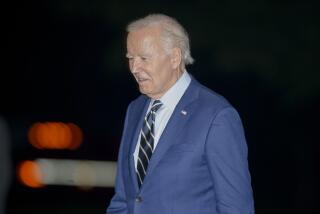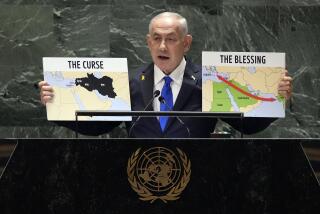Obama and Netanyahu promise to pursue Mideast peace talks
Reporting from Washington — President Obama and Israeli Prime Minister Benjamin Netanyahu sought to put the bad start to their relationship behind them and pledged Tuesday to work together toward face-to-face peace talks in the Middle East.
Netanyahu predicted that direct negotiations with the Palestinians could begin this summer, and he promised “concrete steps” to move the process along in a “very robust way.” But neither leader indicated there had been significant progress during their White House meeting on the issues that hinder prospects for the talks.
The two did not mention the deadly Israeli raid in May on a flotilla trying to break through Israel’s blockade of the Gaza Strip or Israel’s rebuff of international demands for an apology. They also avoided the potentially explosive issue of Jewish settlements.
A freeze on new settlements in the West Bank expires in September, the same month Palestinian officials say they will evaluate whether to continue with U.S.-brokered “proximity” talks, which the Obama administration hopes will lead to the two sides sitting down together.
Obama acknowledged “tensions and issues there that have to be resolved,” but said U.S. and Israeli officials were working on them. He praised steps by Israel this week to ease its blockade of Gaza.
Israel says it restricts items allowed into Gaza to prevent Hamas, the militant group that controls the Palestinian territory, to rebuild its strength and rearm after an Israeli incursion 18 months ago. Under a new policy announced Monday, Israel said it would allow in consumer food products and most household goods. But construction materials, needed to rebuild after the conflict, will be permitted only on a case-by-case basis and under the supervision of the international community.
Israel’s military also moved Tuesday toward punishment of soldiers for misconduct during the 2008-09 Gaza offensive. Some of the cases had already been highlighted by a U.N. investigation that accused Israeli forces as well as Hamas of committing war crimes. Israel rejected the charge.
The Israeli military said an infantry sergeant would be indicted on manslaughter charges in connection with an incident in which two Palestinian women were killed, reportedly while holding a white flag.
The military also said a battalion commander was disciplined for allowing his troops to use a Palestinian civilian as a human shield, and another officer was punished for ordering an airstrike near a mosque.
Netanyahu’s U.S. visit is primarily about fence-mending after a rocky start to his relationship with Obama. The president said he was committed to Israel’s security and pledged to “back that up, not just with words but with actions.”
Netanyahu in turn praised the “depth and richness” of U.S.-Israeli ties, invoking Mark Twain in saying that the “reports of the demise of the special relationship … are just flat wrong.”
The warm words distinguished the visit from Netanyahu’s last visit, in March, when he was consigned with his aides to a White House work room while Obama dined with his family. The mood was so chilly then that television cameras weren’t allowed up close to witness the personal interaction.
A few weeks earlier, Israeli officials had angered the White House by approving new Jewish housing in disputed East Jerusalem just as Vice President Joe Biden was arriving in Israel.
In recent days, the Netanyahu government sent different signals. In a Cabinet meeting over the weekend, Netanyahu publicly set direct talks with Palestinians as a top priority of his upcoming conversation with Obama.
In contrast to Netanyahu’s last visit, the men this time sat by the hearth of the Oval Office, speaking warmly of each other and their nations’ ties.
That link is “unbreakable,” Obama said, describing “the bond of two democracies who share a common set of values and whose people have grown closer and closer as time goes on.” Netanyahu invited Obama to visit Israel, to which Obama smiled and replied, “I’m ready.” No date was set.
As he completed his remarks, Obama reached over to Netanyahu for a protracted handshake.
Before they can make strides toward direct peace talks, the two sides must hash out a host of differences. But Jon Alterman, a Middle East expert at the Center for Strategic and International Studies, a Washington think tank, said Tuesday’s imagery was meaningful.
The Israeli prime minister probably was moved in part by Obama’s attempts to tamp down an international outcry in the wake of the flotilla raid and to promote subsequent talks between Israel and Turkey. Those killed in the raid were Turkish citizens.
That may have reminded Netanyahu that the “U.S. is a good ally to have,” Alterman said, and that “alienating the U.S. is not good.”
On Tuesday, they appeared to have decided it was time to act like adults in public, Alterman said.
“They thought about how to advance their interests,” he said. “And that means making nice.”
Times staff writer Edmund Sanders in Jerusalem contributed to this report.
More to Read
Sign up for Essential California
The most important California stories and recommendations in your inbox every morning.
You may occasionally receive promotional content from the Los Angeles Times.










